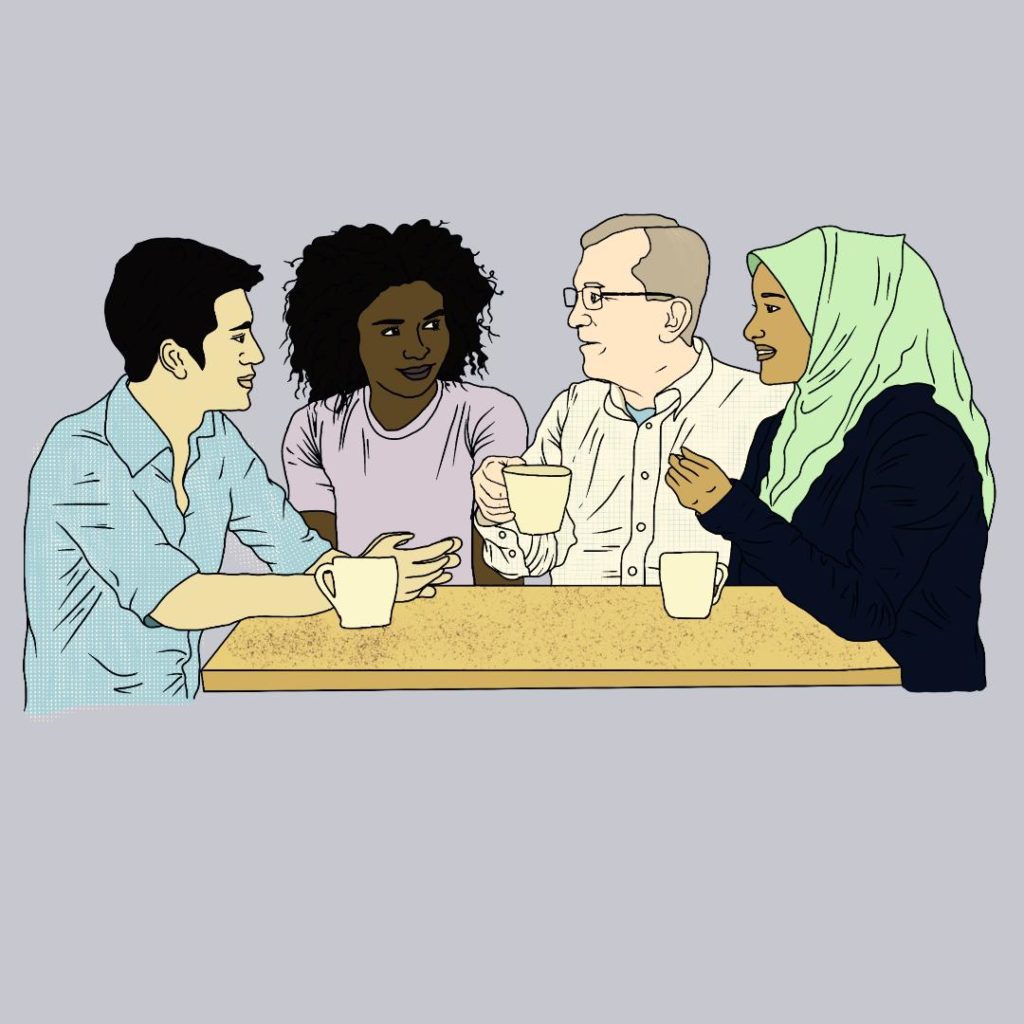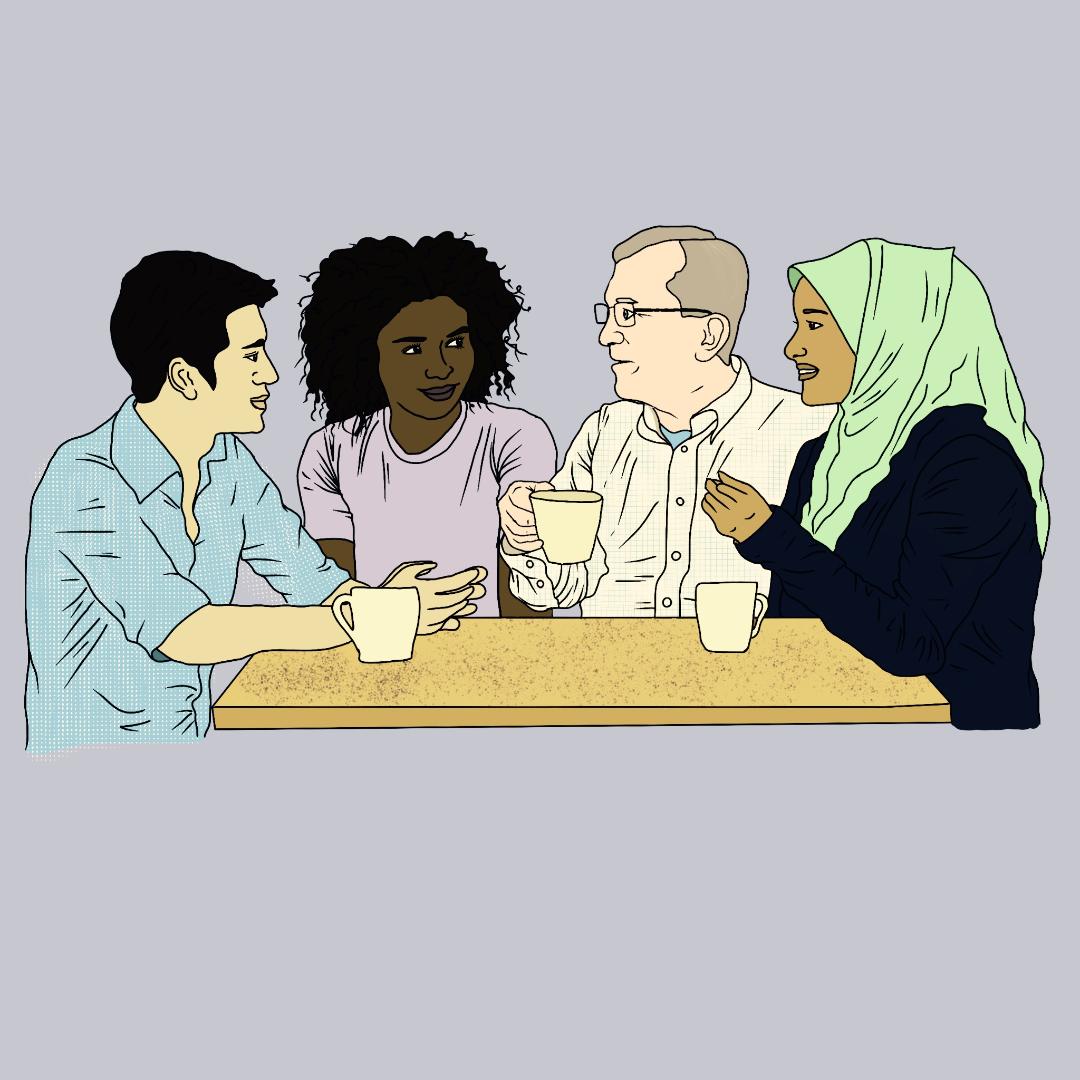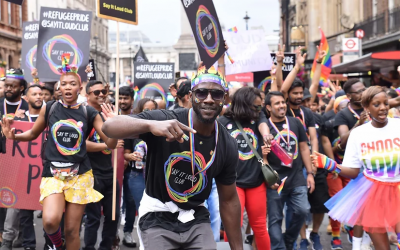Insights on engaging in dialogue with people from diverse backgrounds, with diverse perspectives leading to a meaningful exchange of ideas.
“It is hardly possible to overrate the value… of placing human beings in contact with persons dissimilar to themselves, and with modes of thought and action unlike those with which they are familiar” – J. S. Mill.
‘Fear of saying ‘the wrong thing’ should not stop us from saying anything at all’
– David Isaac, Chair of the Equality and Rights Commission.

At Together in the UK, we try to shed light on the personal stories of people who migrated to the UK, as we believe that engaging in dialogue and understanding different perspectives takes all of us forward. This blog in particular is about how we engage in conversation with people whose life experiences may be different from our owns.
Most people are actually curious about the experience of others, but often we are afraid to start a conversation which may appear rude or intrusive. For this reason, I started this blog with two quotes setting out the importance of creating a dialogue with people who have different experiences and worldviews from ours (with the right tone and circumstances) and how we can learn to see the world from another perspective – something that ultimately can enrich us all.
If we don’t get the tone right, we are left with mutual misunderstanding and no way forward. JS Mil, the British 19th century philosopher, teaches us that if we are brave enough to reach out, life will be fuller. David Isaac, in his article on free speech has an important message for us – that sometimes, we can be so anxious about causing offence, we say nothing and we miss the opportunity to learn and grow.
So to start, something to keep in mind is trying not to deny someone’s difference in an effort to be friendly or inclusive, as this may have opposite results than you meant: to say to someone, ‘I don’t see you as black’, or ‘I see no colour’ or, ‘I don’t see you as white’ or to someone who lives with a disability, ‘I don’t see your wheelchair’ may not help at all. This implies denying their experience of the world – an important aspect of their identity. This may actually end a dialogue, rather than creating one.
In her book, “Brit(ish)” Afua Hirsch talks about being asked everyday, ‘where are you from?’ This is a constant placing of her in the position of the ‘other’. So, this question should also be avoided
So, having begun with two things not to do. What do you do to start a dialogue? My suggestion is that there are 4 aspects to it:
- Find shared points of reference
- Share something of yourself
- Show genuine curiosity
- Put yourself in someone else’s shoes
Find shared points of reference.
There is always something you can find in common with almost anyone. You may be interested in someone’s religious beliefs and if you have your own faith or have been brought up in one, you will have something in common. Shared points of reference comes not just from experience but may also from knowing different cultural stories so if you have read a book or seen a film which gives you an insight into how different people experience life, this is great for starting a conversation. Note, for starting a conversation, you need to use your knowledge as a means of finding out more.
Share something of yourself.
Everyone likes to reciprocate and a conversation becomes one sided if you do not share something. By sharing you also create mutuality, you give someone permission to be curious about you and to learn from you.
Show genuine curiosity.
This is the heart of engaging in dialogue. You come from a position of genuinely wanting to know, to find out more because you want to understand. Jane Huyn (2014) ’ calls this ‘respectful inquisitiveness’. It’s not respectful to ask, ‘where are you from? But people may be happy to answer ‘what is your family origin or family story?’
To start a dialogue, you may need to ask for permission to ask. People may not want to tell you about their experiences for a variety of reasons but that must always be respected but if they do give you their permission, then you have created a context where you can learn more. You also want to enter the dialogue with a genuine desire to learn, rather than coming with fixed views about how people are. Sharing any fixed views will end the dialogue so although often we are being told to project confidence, sometimes being confidently tentative actually is more productive. Useful phrases are ‘I wonder’, ‘I am curious about’ ‘I’d always wanted to know more about’, or ‘I would like to understand more about your experience as xx, can I ask you about it?’ this enables people to share.
Put yourself in someone else’s shoes
This is about understanding that your experience can never be the same as someone else’s and finding out about how someone who is different to you experiences the world involves an imaginative, non-judgemental leap.
As David Isaac says, we need to speak, share our own point of view and we need to engage in real dialogue. This actually takes some skill and thought, so we hope this blog has given you some tips and maybe the courage to start a conversation with someone who is different to you and who you can learn from.
A. Hirsh Brit(ish) On race, identity and belonging (2018)
J. Huyn. A.S.LeeFlex, the new handbook for managing across differences (2014)




